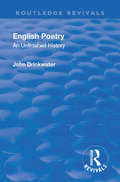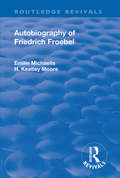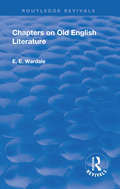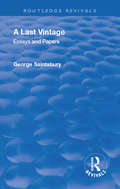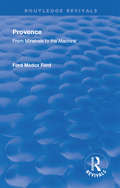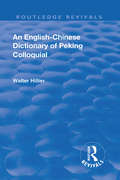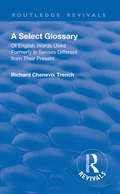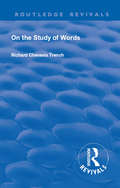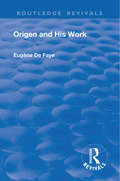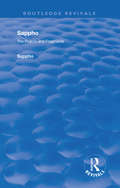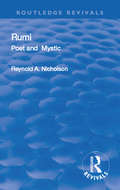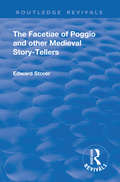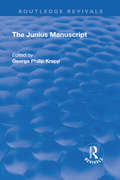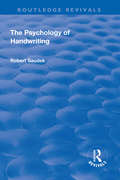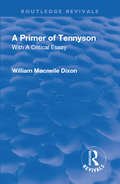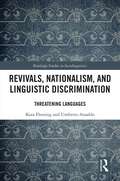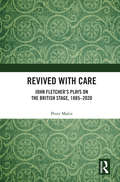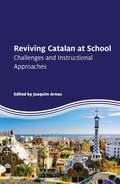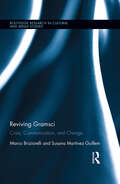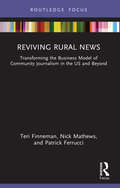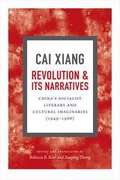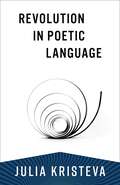- Table View
- List View
Revival: An unfinished history (Routledge Revivals)
by John DrinkwaterWhen a Poet writes poetry he can scarcely fail to interest. And the author of this posthumous volume was not only a poet but no mean critic too. As a result, his approach to English Poetry is not a work of merely casual interest: it is illuminating. No one could fail to be enriched and delighted by its discriminating enthusiasms, its happy quotations, and the no less happy judgements, discoveries, definitions and phrases which it gives us. The historical portion is contained in the latter half, which deals with its subject in a discursive way from the beginnings to Elizabethan times - where the author stopped in the middle of a sentence. This premature ending is deepy regretted. But, fortunately for us, the first five chapters are devoted to general and personal observations, and are so full of references to the intervening and modern periods that we can genuinely claim to have here a fair impression of Drinkwater's view of the whole panorama of English Poetry.
Revival: Autobiography of Friedrich Froebel (Routledge Revivals)
by Friedrich FroebelOriginally published in 1915, the Autobiography of Fredrich Froebel provides a detailed overview of the life of the eminent German educator Fredrich Froebel, it charts his life and looks at his significant contribution to the field of education, including his Idealist philosophy of early childhood education, and his establishment of the kindergarten, a school for four-and five-year-old children that is found worldwide. The book also looks at the community surrounding Froebel and includes a chapter by Madame Louise Froebel’s providing a reminiscence of her husband’s life.
Revival: Chapters on Old English Literature (Routledge Revivals)
by Edith Elizabeth WardaleThese chapters on Old English Literature are intended to fill the gap between Professor Thomas’s valuable, but all too brief account in his English Literature before Chaucer, and longer works, such as those of Stopford Brooke and the Chapters in the first volume of the Cambridge History of English Literature. My primary object has, of course, been to make the works themselves known to my readers, but I have also tried to trace the development of prose and poetry during the period, showing in the poetry the modifications of the original Germanic character brought about by later influences of all kinds, and noting those forms or features which lead on to Middle English. In dealing with the many unsettled questions, I have given only the views which seem to me most important. Had I wished to do more, it would obviously have been impossible in the space which I have allowed myself; but references to other works are added for a student who may wish to make a more thorough investigation of such points for himself.
Revival: Essays and Papers by George Saintsbury (Routledge Revivals)
by George Edward SaintsburyThe Editors of the Saintsbury Memorial Volume have been encouraged by the welcome which that book received to make a final gathering of George Saintbury's writings. From a score of different sources they have chosen essays and papers that have lain uncollected, with their themes ranging from Captain Marryat to Erasmus, from Rosetti to Xenephon, from Swinburne to Balzac's early pot boilers. Included is an entrancing study of the literary associations of the city of Bath; and the editors have followed Saintbury's own example by collecting a Scrap Book more than thirty shorter notes and jeux d'esprit on all kinds of subjects: wigs, sensation novelists, Drummond and Ben Jonson, George Sand, compulsory Greek at Oxford, Shakespeare and Welsh, Laurence Sterne tittle-tattle, Marcel Proust, and much else in true Saintsburian vein.
Revival: From Minstrels To The Machine (Routledge Revivals)
by Ford Madox Ford"Provence" may perhaps be described as the crystallisation of the main idea running through the Great Trade Route, which we published a year ago. Of that book Mr A.G. McDonnell wrote in the Observer: "It is an Indictment, a Philipic....I know of no books to compare with this since Winwood Reade's Martyrdom of Man" But if "The Great Trade Route" was the destructive onslaught on dubious aspects of contemporary civilisation, "Provence" is the celebration of what might have been and what, according to Mr. Ford, may still yet be - contrasted with what is. For in that triangle of sun-baked , wind-swept, austere yet generous land, bounded as to its base by the Mediterranean and as to its sides, by the Rhone and the Alps, Mr Ford sees all the pride of past European splendour, the small healthy core of Europe's ailing present, the only promise for her future. How and why he sees all this his book alone can reveal, with its history, its moralisings, its descriptions vitalised and clarified by art.
Revival: New Edition Enlarged by Sir Trelawny Backhouse and Sidney Barton (Routledge Revivals)
by Walter Caine HillierMany of the marks attached to the phonetic rendering of the Chinese words in this volume differ from those assigned to them in the dictionaries. These apparent discrepencies are intentional, the tones being given as they are applied, or appear to the ear of the compiler to be applied, by the natives of Peking.
Revival: Of English Words Used Formerly in Senses Different from their Present (Routledge Revivals)
by Richard Chenevix TrenchThis volume is intended to be a contribution to a special branch of the study of our own language. It proposes to trace in a popular manner and for general readers the changes of meaning which so many of its words have undergone; words which, as current with us as they were with out forefathers, yet meant something different on their lips from what they mean on ours.
Revival: On the Study of Words (Routledge Revivals)
by Richard Chenevix TrenchFirst published in 1904, this book contains the conclusions of a series of lectures exploring the moral and historical value of single words. The author argues that, just as wisdom and knowledge are discoverable in books, so too are these treasures to be found in individual words themselves.
Revival: Origen and his Work (Routledge Revivals)
by Eugene de FayeLast year (1925) the Olaus Petri Endowment greatly honoured the author by inviting him to deliver a few lectures on Origen at the University of Upsala. It was agreed that they should be published and we now offer them to the public exactly as they were delievered. There could be no question of expounding the entire thought of Origen in eight conferences. We have been compelled to pass over more than one important doctrine - for instance, his ideas on the Gnosis. Still less was it possible to set forth in these lectures the enormous mass of documents upon which our exposition of the theology of Origen is based.
Revival: Sappho - Poems and Fragments (Routledge Revivals)
by SapphoThe object of this book is to provide with a popular and a comprehensive edition of Sappho, containing all that is so far known of her unique personality and her incompatible poemsLittle remains today of the writings of the archaic Greek poet Sappho (fl. late 7th and early 6th centuries B.C.E.), whose work is said to have filled nine papyrus rolls in the great library at Alexandria some 500 years after her death. The surviving texts consist of a lamentably small and fragmented body of lyric poetry--among them, poems of invocation, desire, spite, celebration, resignation, and remembrance--that nevertheless enables us to hear the living voice of the poet Plato called the tenth Muse. Sappho is rated as the supreme poetess and is regarded in the same vein as Shakespeare and Homer the supreme poets.
Revival: Selections from his Writings, Translated from the Persian with Introduction and Notes (Routledge Revivals)
by Maulana Jalāl al-Dīn RūmīTo the English reader the mysticism of Rumi opens a new world of spiritual and poetical experience. "God is One but religions are many" runs the Sufi teaching; and the English reader can here enlarge his experience by apprehending the mystic intuition of a great Persian poet. The late author's beautiful and faithful translations are illuminated by Notes on Sufi doctrine and experience. The author did not finish the Introduction, but it has been completed by his old pupil and friend, Professor A. J. Arberry, who has seen the book through the press.
Revival: The Facetiae of Poggio and Other Medieval Story-tellers (Routledge Revivals)
by Poggio Bracciolini,The facetie, as a literary form, has an ancient lineage, while, if we regard it merely as a humorous tale or jocular anecdote, its history must be almost as old as the first laughs and smiles of prehistoric man. To go back no further, we may trace it in a direct line through Latin literature, to the Greek apopthegm. Facetiae, in the literary sense, are also to be found in Oriental literature, espeically the Persian and the Arabian. The Greek apopthegm and its Roman successor had a different character from the Florentine facetia, but the difference is one rather of matter than form. The ribald, licentious note is not so common in the classic facetaie, and the historical anecdotes treating of kings, princes, and persons of high estate were mostly reverent and often adulatory. Satire and disrespect appeared in the humorous tales of Poggio and his peers. The apopthegm was, as a rule, a brief narrative, as often as not enclosing a moral lesson in an historical anecdote. Or else it was the saying of some wise or great man.
Revival: The Junius Manuscript (1931) (Routledge Revivals)
by George Philip KrappThis book is the first volume in a collective edition, the plan of which includes all the surviving records of Anglo-Saxon poetry. The main body of Anglo-Saxon poetry as it has come down to us is contained in four important miscellany manuscripts, the Junius Manuscript, the Vercelli Book, the Exeter Book, and the Beowulf Manuscript, each of which will constitute a separate volume in this edition. The remaining minor and more or less scattered examples of Anglo-Saxon poetry will be grouped together, in a volume of volumes of their own.
Revival: The Psychology Of The Poet Shelley (1925) (Routledge Revivals #No. 33)
by Edward Carpenter George BarnefieldLate studies in the Psychology of Sex have led to some interesting speculations with regard to the poet Shelley; and it is with pleasure that I write a few lines by way of introduction to the following paper by my friend, George Barnefield, which puts very clearly, as I think, some points in Shelley's temperament which have hitherto been neglected or misunderstood, and which call for renowned consideration. Not having myself made a special study of the Modern Psychology, I do not pretend to certify to the absolute truth of the theories put forward by Mr. Barnefield, but I do certainly think, after due consideration, that they are worthy of very careful study.
Revival: The Psychology of Handwriting (Routledge Revivals)
by Robert SaudekGraphology, in English and American manuals of handwriting, stands in the relation with all other pseudo-sciences, founded on half truths and wrought with superstition and amateur fads, compared to modern science. In this book, the author attempts to put before the English public the fundamental principles, methods and laws of scientific graphology. Contents: common objections to graphology and their refutation; history of graphology; physiology and psychology of writing; random test of the correctness of methods explained; practical hints for drawing up of graphological analyses; specimens of analysis.
Revival: With a Critical essay (Routledge Revivals)
by Macneile W DixonThis book was the first sign of the gorgeous Indian summer which was to diffuse its golden splendours over the remainder of Alfred Tennyson's career, and to end only with his life.
Revivals, Nationalism, and Linguistic Discrimination: Threatening Languages (Routledge Studies in Sociolinguistics)
by Umberto Ansaldo Kara FlemingIs linguistic revival beneficiary to the plight of newly emerging, peripheral or even ‘threatened’ cultures? Or is it a smokescreen that hides the vestiges of ethnocentric ideologies, which ultimately create a hegemonic relationship? This book takes a critical look at revival exercises of special historical and geopolitical significance, and argues that a critical and cautious approach to revival movements is necessary. The cases of Sinhala, Kazakh, Mongolian, Catalan, and even Hong Kong Cantonese show that it is not through linguistic revival, but rather through political representation and economic development, that the peoples in question achieve competitiveness and equality amongst their neighbors. On the other hand, linguistic revival in these and other contexts can, and has been, used to support nationalist or ethnocentric agendas, to the detriment of other groups, recreating the same dynamics that generated the argument for revival in the first place. This book argues that respect for linguistic and other diversity, multilingualism and multiculturalism, is not compatible with linguistic revival that mirrors nation-building and essentializing identity construction.
Revived with Care: John Fletcher’s Plays on the British Stage, 1885–2020
by Peter MalinThis book presents a ground-breaking, comprehensive study of the modern performance history of plays in the John Fletcher canon, excluding his collaborations with Shakespeare. It examines how seventeen of Fletcher’s plays have been interpreted in British productions. In addition, the book offers a consideration of the contexts in which these productions took place, from the early twentieth century ‘Elizabethan Revival’ to the more politicized theatrical cultures of the 1960s and beyond. Revived with Care opens a window on some of the theatrical developments of the past 135 years, in the context of radical changes in the presentation and reception of early modern drama, while for theatre practitioners it provides ideas and inspiration for exploring little-known but powerful plays in exciting new productions. The book will be of great interest to students, scholars and practitioners working in the field of theatre and performance studies.
Reviving Catalan at School
by Joaquim ArnauThis book presents a comprehensive picture of languages and schools in Catalan-speaking countries, making much of the information available in English for the first time. The chapters examine multiple aspects of the language situation in these countries, including: the recovery of Catalan in schools; the position and status of the majority languages (English and Spanish); language-in-education policies in a multilingual, multicultural context; the possibility of multilingual competence; and the successes and failures of instructional processes.
Reviving Gramsci: Crisis, Communication, and Change (Routledge Research in Cultural and Media Studies)
by Marco Briziarelli Susana Martínez GuillemEngaging debates within cultural studies, media and communication studies, and critical theory, this book addresses whether Gramscian thought continues to be relevant for social and cultural analysis, in particular when examining times of crisis and social change. The book is motivated by two intertwined but distinct purposes: first, to show the privileged and fruitful link between a "Gramscian Theory of Communication" and a "Communicative Theory of Gramsci;" second, to explore the ways in which such a Gramscian perspective can help us interpret and explain different forms of political activism in the twenty-first century, such as "Occupy" in the US, "Indignados" in Spain, or "Movimento Cinque Stelle" in Italy.
Reviving Rural News: Transforming the Business Model of Community Journalism in the US and Beyond (ISSN)
by Patrick Ferrucci Teri Finneman Nick MathewsBased on extensive research into weekly rural publishers and rural readers, Reviving Rural News demonstrates that a new financial approach to community journalism is urgently needed and viable.This book provides historical context for the state of local news, examines the influence of journalistic identity and boundaries that have prevented change, and offers practical guidance on how to adapt the financial strategies of weekly newspapers to the habits of modern readers. Findings are grounded in robust data collection, including surveys, focus groups, and a year-long oral history study of a small weekly newspaper group in the United States. A new model known as Press Club is presented as a template via which memberships, events, and newsletters can better engage community journalism with its audiences and create a more sustainable path for the future.Reviving Rural News will be of interest to advanced students and researchers of local, community, and rural journalism as well as practitioners looking to bring about real-world change in journalism organizations.
Revolting Families
by Carrie Smith-PreiRevolting Families places the literary depiction of familial and intimate relations in 1960s West Germany against the backdrop of public discourse on the political significance of the private sphere. Carrie Smith-Prei focuses on debut works by German authors considered to be part of the "new" and "black" realism movements: Dieter Wellershoff, Rolf Dieter Brinkmann, Gisela Elsner, and Renate Rasp. Each of the works by these authors uses depictions of neurosis, disgust, vertigo, or violence to elicit a reaction in readers that calls them to political, social, or ethical action.Revolting Families thus extends the concept of negativity, which has long been part of post-war German philosophical and aesthetic theory, to the body in German literature and culture. Through an analysis of these texts and of contextual discourse, Smith-Prei develops a theoretical concept of corporeal negativity that works to provoke socio-political engagement with the private sphere.
Revolution and Its Narratives: China's Socialist Literary and Cultural Imaginaries, 1949-1966
by Rebecca E. Karl Xiang Cai Xueping ZhongPublished in China in 2010, Revolution and Its Narratives is a historical, literary, and critical account of the cultural production of the narratives of China's socialist revolution. Through theoretical, empirical, and textual analysis of major and minor novels, dramas, short stories, and cinema, Cai Xiang offers a complex study that exceeds the narrow confines of existing views of socialist aesthetics. By engaging with the relationship among culture, history, and politics in the context of the revolutionary transformation of Chinese society and arts, Cai illuminates the utopian promise as well as the ultimate impossibility of socialist cultural production. Translated, annotated, and edited by Rebecca E. Karl and Xueping Zhong, this translation presents Cai's influential work to English-language readers for the first time.
Revolution and Other Essays
by Jack LondonRevolution The somnambulists The dignity of dollars Goliah The golden poppy The shrinkage of the planet The house beautiful The gold hunters of the North Fomá Gordyéeff These bones shall rise again The others animals The yellow peril What life means to me.
Revolution in Poetic Language (European Perspectives: A Series in Social Thought and Cultural Criticism)
by Julia KristevaIn Revolution in Poetic Language, Julia Kristeva explicates her foundational distinction between the semiotic and the symbolic and explores their interrelationships. Linking the psychosomatic to the literary and the literary to a larger political horizon, she questions the premises of linguistic, psychoanalytic, philosophical, and literary theories.
